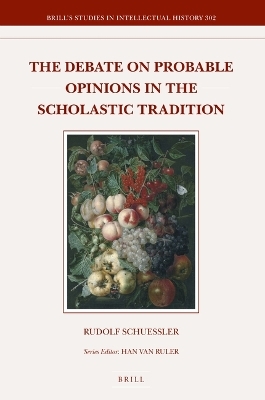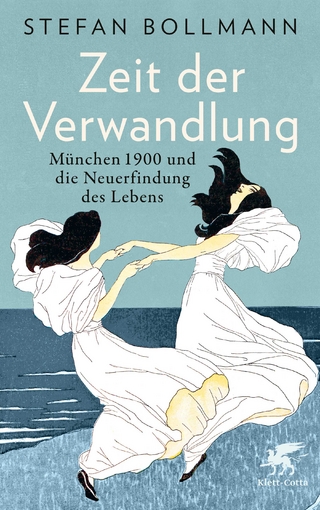
The Debate on Probable Opinions in the Scholastic Tradition
Brill (Verlag)
978-90-04-37024-1 (ISBN)
In The Debate on Probable Opinions in the Scholastic Tradition, Rudolf Schuessler portrays scholastic approaches to a qualified disagreement of opinions. The book outlines how scholastic regulations concerning the use of opinions changed in the early modern era, giving rise to an extensive debate on the moral and epistemological foundations of reasonable disagreements. The debate was fueled by probabilism and anti-probabilism in Catholic moral theology and thus also serves as a gateway to these doctrines. All developments are outlined in historical context, while special attention is paid to the evolution of scholastic notions of probability and their importance for the emergence of modern probability.
Rudolf Schuessler is professor of philosophy at the University of Bayreuth, Germany. His areas of specialization include scholastic approaches to disagreement, moral uncertainty, and probability, as well as modern practical ethics and theories of justice.
Acknowledgments
Introduction
1 Innovations in the Early Modern Era
2 Plurality and Pluralism
3 Modern Approaches to the ‘Use of Opinions’: Social Epistemology, Testimony, and Others
4 Sources, Genres, and Interpretations
5 Chapter Preview
1 Medieval Antecedents
1 Medieval Scholastic Attitudes to the Variety of Opinions
2 Knowledge, Faith/Conviction (fides), and Opinion in the Middle Ages
3 Probability as Standard for the Acceptability of Opinions
4 ‘Medieval Tutiorism’
5 A Medieval Pluralism of Opinions
6 Conclusion
2 The Road to Probabilism—A New Doctrine on the Use of Opinions
1 From the Late Fifteenth to the Late Sixteenth Century
2 Probabilism
3 Discussion and Conclusion
3 Probabilism and Anti-probabilism—Interlocked Lifecycles
1 1577–1620: the Rise of Probabilism
2 1620–1656: Probabilism as Dominant Mainstream
3 1656–1700: Probabilism Under Fire. The Rise of Anti-Probabilism. Probabilism’s Defenses. The Epistemological Debate Unfolds
4 1700–1773: More Debate, New Developments, and the Geography of Persistence
5 1773–Present: Living On in Catholic Moral Theology
4 The New Dual Notion of Probability and the Demise of the Endoxon
1 The New Dual Concept of Probability
2 Maryks’ Claim of the Jesuit Origins of Dual Probability
3 Ciceronian Influences?
4 The Heyday of the (Unrefined) Dual Concept of Probability
5 Intrinsic and Extrinsic Probability
6 Leaving Aristotle without Saying Goodbye
7 Conclusion
5 Selection Criteria, Common Opinion, and Ordinary Persons
1 Selection Criteria for Authors and Opinions
2 Sets of Criteria from the Seventeenth Century
3 Common Opinion
4 Ordinary Persons and Non-Experts (Illiterati, Idiotae)
5 Conclusion
6 Stand-Alone Authority and Majorities as Guide to Truth
1 Aquinas on Following One’s Teacher
2 Stand-Alone Authority in Probabilism
3 Anti-probabilism: Opponents of Stand-Alone Authority
4 Numerical Thresholds of Extrinsic Probability
5 The Early Modern Philosophical Avant-Garde on Stand-Alone Authority
6 Epistemic Majoritarianism: Scholastic and Modern
7 Conclusion
7 Ancient and Modern Opinions—Which to Prefer?
1 Antiqui and Moderni in Scholastic Thought
2 Probabilism as Vector of Modernization
3 Caramuel and the Moderns
4 Anti-probabilist Backlash
5 The querelle des anciens et des modernes: Parallels and Influence
6 Conclusion
8 The Great Debate on Probable Opinions (1656–1700)
1 New Conceptions of Probable Opinion and Probability
2 Kinds of Probability
3 Key Assumptions of Anti-probabilism
4 Conclusion
9 Delimiting the Space of the Reasonable—The Challenge of Probable Probability and Slight Probability
1 The Debate on Slight and Probable Probability
2 An Argument of Infinite Regress
3 The Spectre of Skepticism
4 Caramuel and Probable Probability
5 Conclusion
10 Believing What We Want—A New Doxastic Voluntarism
1 Scholastic Doxastic Voluntarism before the Seventeenth Century
2 Probabilist Doxastic Voluntarism after Bianchi
3 Mature Probabilist Doxastic Voluntarism: Anthony Terill’s Approach
4 Terill Further Considered
5 Conclusion
11 Assessing Probabilism—Between Liberty and Tutelage
1 Modern Views on Probabilism: Liberty, Tutelage, Extrinsicism
2 The Perspective of Normative Theory
3 The Perspective of Practice and the Historical Perspective
4 Conclusion
12 The Scholastic Background of Modern Probability
1 Gambling Problems and Interpretations of Probability
2 Caramuel’s Contribution
3 A New Scholastic Frequentism
4 Scholastics on Aleatory Contracts and Expected Value
5 Other Developments
6 Why Did a Mathematical Theory of Probability Emerge in the Middle of the Seventeenth Century?
References
Index
| Erscheinungsdatum | 15.04.2019 |
|---|---|
| Reihe/Serie | Brill's Studies in Intellectual History ; 302 |
| Verlagsort | Leiden |
| Sprache | englisch |
| Maße | 155 x 235 mm |
| Gewicht | 962 g |
| Themenwelt | Geschichte ► Allgemeine Geschichte ► Neuzeit (bis 1918) |
| Geisteswissenschaften ► Geschichte ► Geschichtstheorie / Historik | |
| Geisteswissenschaften ► Philosophie ► Erkenntnistheorie / Wissenschaftstheorie | |
| Geisteswissenschaften ► Philosophie ► Philosophie des Mittelalters | |
| Geisteswissenschaften ► Religion / Theologie | |
| ISBN-10 | 90-04-37024-2 / 9004370242 |
| ISBN-13 | 978-90-04-37024-1 / 9789004370241 |
| Zustand | Neuware |
| Informationen gemäß Produktsicherheitsverordnung (GPSR) | |
| Haben Sie eine Frage zum Produkt? |
aus dem Bereich


